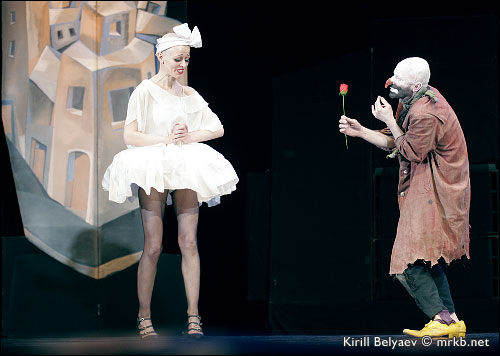Once.
Once upon a time…
Once. But in another time, not this time. Another world, not this one. We have entered another world, another time. An ethereal world, outside the boundaries of space and time. (Ether is the substance that angels are made from…)
Once upon a time there was…
A pair of angels looking down upon a world. A tiny toy doll.
A cafe, with tables and chairs, and pictures of ships a-sailing. And a radio, pinned askew on a wall.
On the radio, a dancehall foxtrot.
In the cafe, which may well be the restaurant at the end of the universe, a waitress. A pretty doll-like girl in a little white dress and bunny ears, she trips merrily across the floor with her clickety-clackety high heels. She sits at a table and daydreams. She stands and tweaks her dress and ears. Someone who might be the janitor, someone of low status anyway, comes in pushing a broom across the floor, his vulture-like head jerking forwards, his tatty beige coat falling off his lanky frame – a downbeat clown, with big yellow shoes and a red nose. His heart is broken, that is obvious – he is wearing his heart on his sleeve. Enter the customer, a suave gentleman in a dapper black suit. He calls for the menu, he orders a fish. He’s obviously a fishy character…
These are our three main characters – or perhaps archetypes rather than characters is the better word, for we are in a world of fairy tales and dreams. The pretty ballerina, the princess, a version of Columbine; the heartbroken clown who wants to win her love; the suave dastardly villain who wants her too, and will fight him to the death for her love. Meanwhile, a very stupid cupid has come and gone – he seems too big for his own body, limbs akimbo like a young colt. He misses his target, fires offstage, breaks his arrows (and later his bow). He is useless.
The scene is set…
There follows a thrilling word-free montage of clever clowning sequences, eccentric and beautifully executed choreography, and gorgeous moving pictures – sometimes literally, as the painted storybook scenery seemingly shifts itself, or the wonky pictures on the walls slide away to reveal startled faces.
The fairy-tale and mythological references come thick and fast. Here, a leaping and dancing Sinbad the Sailor (or maybe it’s the Prince of Persia) with his sabre flashing and cutting the air; there, a kind of Trojan Horse, a giant head hiding two people inside it. The simple props are used with a child-like glee: a cardboard fish on a dish is thrown across the room; a piece of piping becomes a periscope; a head pokes through a cardboard box tied up with a bow.
The soundscape is an eclectic musical mix – a kind of jukebox of cultural dreams and memories. Waltzes and polkas. Distorted fairground organs. Mournful blues numbers, and a cheesy rendition of Brazil.
Music and physical action work together beautifully. There’s a gentle repeated waltz motif as the Girl and the Suitor face each other from either side of the stage, stepping forward and back in time; and a joyous polka as they dance around the room together, as the Clown looks on in anger and despair. The Clown, seized by a demented desire, plays out a totally stupid and funny heavy-metal cock-rock dance with a cardboard falling star.
Once is one of Derevo’s lighter and gentler pieces of work – although not without its dark and dangerous edges. An hour and a half skips by quickly – we lap it all up eagerly.
It is great to see Derevo, the Russian maestros of physical/visual theatre, back in the UK – and oh what a joy it is to see the company’s three founder members Anton Adasinsky (the heartbroken Clown), Elena Yarovaya (the lovely Girl) and Tanya Khabarova (the villainous Suitor) reunited on stage. All three give superb performances, working beautifully together. The trio of central performers are aided and abetted most ably by Aleksey Popov, Makhina Dzhurayeva and Aleksey Merkushev. The fabulous fairy-tale set is designed by Maxim Isaev.
Twenty years on, Once has an added poignancy – it is even more touching and funny and heartbreaking than it was 20 years ago. And with its universal theme of unrequited love and broken hearts, it is a timeless play that will never cease to entertain us and thrill us through and through. Love hurts, for sure.

